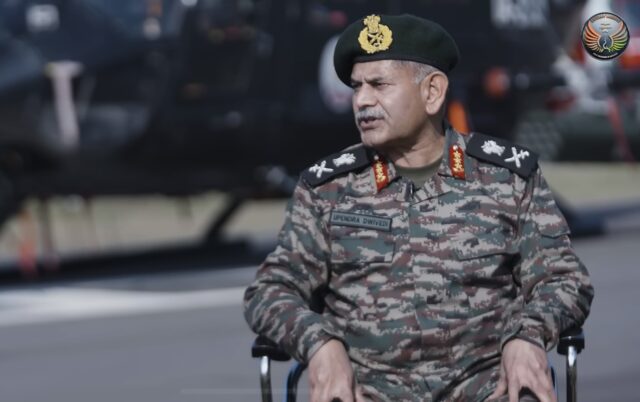UDHAMPUR, J&K: This year will be the fifth since Article 370 was abrogated in Jammu and Kashmir and the state bifurcated into the union territories of J&K and Ladakh. So what has changed on the ground?
It has brought about a change in mindsets; the society is accepting the move as a welcome step, says Northern Army Commander Lt Gen Upendra Dwivedi. And it also has had a bearing on terrorism. Incidents of terrorism last year were about a quarter of what was seen the year before; recruitment of terrorists came down to 15 from 61 in 2020, the Army commander told StratNews Global Editor-in-Chief Nitin A. Gokhale in an exclusive interview recorded on November 23 last year.
The upbeat mood is reflected in other parameters as well. “Today, the hustle and bustle in Lal Chowk (Srinagar) is like what you see in Chandni Chowk (Delhi); tourist arrivals in J&K last year (at over 2.3 crore) registered a 25 per cent jump from 2022; last year’s Amarnath Yatra saw about 4.5 lakh pilgrims, compared to 3.75 lakh the year before. So all indicators point towards development.”
The Army is playing a pivotal role in integrating J&K with the national mainstream, said Lt Gen Dwivedi, adding that the pace of infrastructure development has increased in the last four-five years. And soldiers are playing a role in the economic turnaround as well. “The salaries of servicemen posted in J&K amounts to approximately ₹7,400 crore; even if 20 per cent of that is pitched back (spent locally), you can imagine (how it contributes to the local economy).”
A sapling planted in August 2019 (when Article 370 was abrogated) has now become a mini plant; it’s for all stakeholders to protect it so that it becomes a big tree, he said. “The overall situation in J&K now is normal but with a degree of caution.”
Pakistani Designs
Attempts of infiltration along the Line of Control (LoC) were very, very high in 2023 though we have ensured “zero infiltration”, the commander told StratNews Global. As many as 43 foreign terrorists were killed along the LoC last year, which is 200 times the cumulative figure of the previous three years taken together; that’s something which is not palatable to Pakistan, which is trying to send foreign terrorists and also trying to revive local terrorists who has crossed over but have become quiet. Since terror recruitment has gone down in the hinterland, they are now trying to send foreign terrorists with a view to reviving terrorism, said Lt Gen Dwivedi.
Change In Pakistani Tactics?
Given the terror incidents of late in the south of the Pir Panjal ranges, is there a change of tack by Pakistan? In the last 10 years, Rajouri, Poonch, Doda and Kishtwar have seen major development, something Pakistan could not digest. Terrorists can move in through these areas and they were trying to revive the ecosystem but in the process a high number of foreign terrorists have been neutralised, he added.
Situation In PoK
There’s a lot of resentment in Gilgit-Baltistan as the dividends of infrastructure projects are not being fed to the local population, said Lt Gen Dwivedi. There have been videos of people saying they buy atta (flour) at 1200 rupees a kilogram whereas in India it’s available for ₹40, so why shouldn’t they come to India and buy it? “In the border areas, the resentment against (Pakistan’s) administrative high-handedness is very high. We have ensured zero infiltration because we have got information on where the launch pads and terrorist camps are.” Approximately 300 terrorists are waiting to be inducted and there are 10-12 camps that are active now along the border, according to the Army commander.
Silos In Terror Ecosystem
Foreign terrorists are given adequate training before being sent across to India and the communication equipment they have is of superior quality; the terror ecosystem operates in silos; there are three-four people involved in supporting the terrorists but nobody knows the other. That’s why the terrorists and the ecosystems need to be addressed together, said Lt Gen Dwivedi.
‘Seek And Destroy’
“Earlier, in the hinterland, we used to wait for the terrorists but now it’s ‘seek and destroy’, a complete change in tactics and procedures which has ensured that terrorists can’t take shelter in underdeveloped areas anymore.” In such an operation, the degree of difficulty for security forces will be high and so will the number of casualties but we will keep leading from the front, said the Northern Army Commander.
Also See:
















